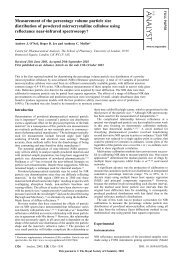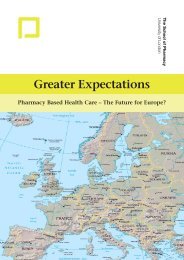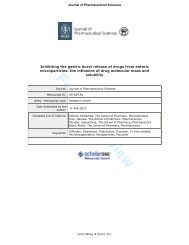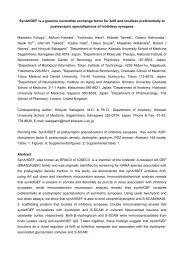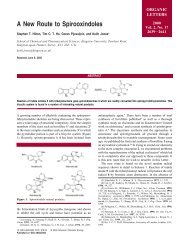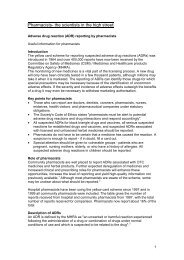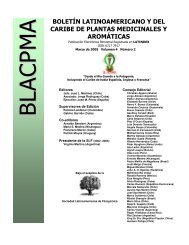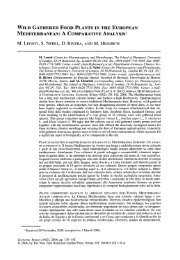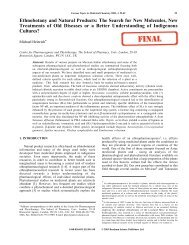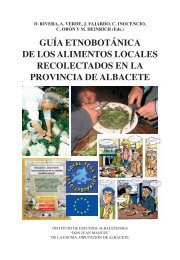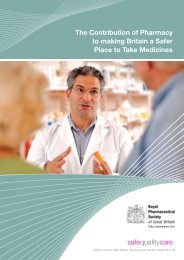Inhaler technique in Turkish people with poor English: a case of ...
Inhaler technique in Turkish people with poor English: a case of ...
Inhaler technique in Turkish people with poor English: a case of ...
Create successful ePaper yourself
Turn your PDF publications into a flip-book with our unique Google optimized e-Paper software.
108 Pharm World Sci (2006) 28:107–114<br />
Introduction<br />
Good <strong>in</strong>formation on how to take or use medic<strong>in</strong>es<br />
is important if <strong>people</strong> are to get the most<br />
benefit from them. In the European Union,<br />
comprehensive leaflets for patients are now<br />
mandatory [1], and all medic<strong>in</strong>e packs should<br />
conta<strong>in</strong> a leaflet as a package <strong>in</strong>sert, produced by<br />
the manufacturer. In the United K<strong>in</strong>gdom, these<br />
leaflets are written <strong>in</strong> <strong>English</strong>. Translation support<br />
for patients is available <strong>in</strong> hospitals and primary<br />
care, but provision is patchy and services<br />
over-stretched.<br />
People whose first language is not <strong>English</strong> (non-<br />
EFL) may therefore, have difficulty <strong>in</strong> access<strong>in</strong>g<br />
<strong>in</strong>formation about their medic<strong>in</strong>es. This puts them<br />
at a significant disadvantage, yet there has been<br />
relatively little research [2, 3] <strong>in</strong> this area.<br />
Asthma is one example <strong>of</strong> a condition where<br />
the <strong>in</strong>ability to understand and use pr<strong>in</strong>ted<br />
<strong>in</strong>formation (functional illiteracy) could compromise<br />
effective management. The metered dose<br />
<strong>in</strong>haler (MDI) is the first choice device for most<br />
<strong>people</strong> <strong>with</strong> asthma but these devices are not easy<br />
to use well [4–7] and many patients have problems.<br />
If the <strong>in</strong>haler is pressed before the person<br />
starts to breathe <strong>in</strong>, then a good portion <strong>of</strong> the<br />
released dose will be lost. It is also important that<br />
the user breathes <strong>in</strong> deeply, and then holds their<br />
breath, to maximise drug delivery to the lungs.<br />
Good <strong>in</strong>struction can help to overcome these<br />
difficulties, [8, 9] particularly <strong>in</strong> relation to a <strong>poor</strong><br />
hand/lung co-ord<strong>in</strong>ation. However, regular review<br />
takes staff time [10] and is not universally available.<br />
For many users <strong>in</strong> the UK, the first and only<br />
<strong>in</strong>formation they get on how to use their <strong>in</strong>haler is<br />
the patient <strong>in</strong>formation leaflet (PIL) <strong>in</strong>side the<br />
pack. People <strong>with</strong> <strong>poor</strong> <strong>English</strong> read<strong>in</strong>g skills may<br />
not be able to understand this <strong>in</strong>formation, and<br />
could use their <strong>in</strong>haler <strong>in</strong>correctly, result<strong>in</strong>g <strong>in</strong><br />
sub-optimal dos<strong>in</strong>g and sub-optimal response.<br />
The first aim <strong>of</strong> this study was to test this<br />
hypothesis by compar<strong>in</strong>g <strong>in</strong>haler <strong>technique</strong> <strong>in</strong><br />
MDI users <strong>with</strong> <strong>poor</strong> <strong>English</strong> (EP) and <strong>people</strong><br />
whose first language was <strong>English</strong> (FE). For the<br />
EP group, we chose to study <strong>people</strong> <strong>of</strong> <strong>Turkish</strong><br />
orig<strong>in</strong>, as previous work [11] <strong>in</strong> Har<strong>in</strong>gey, London<br />
had suggested the language barrier was a significant<br />
factor <strong>in</strong> medic<strong>in</strong>es compliance.<br />
123<br />
The second aim was to evaluate two <strong>in</strong>terventions:<br />
a translated PIL plus verbal support from a<br />
translator, and a multimedia touch screen system<br />
(MTS) which provides the same <strong>in</strong>formation<br />
us<strong>in</strong>g video clips <strong>of</strong> an actual demonstration<br />
<strong>with</strong> own-language voice-over <strong>in</strong>struction. It was<br />
hypothesised that the MTS system might reduce<br />
the need for translator support.<br />
Method<br />
This was a s<strong>in</strong>gle bl<strong>in</strong>d randomised controlled<br />
trial <strong>with</strong> two groups: MTS and a translated leaflet<br />
plus support from a translator fluent <strong>in</strong> <strong>Turkish</strong><br />
and <strong>English</strong> (PIL + verbal).<br />
Patient allocation was done us<strong>in</strong>g random<br />
number tables. Patients did not know <strong>in</strong> advance<br />
which <strong>in</strong>formation method they would receive.<br />
The MTS system covered the material shown<br />
<strong>in</strong> Table 1 <strong>with</strong> additional <strong>in</strong>formation on posture.<br />
The subject could <strong>in</strong>teract <strong>with</strong> the program<br />
by select<strong>in</strong>g to replay a step, or move on to the<br />
next one.<br />
The leaflet was produced by one <strong>of</strong> the authors<br />
(ZD) and was an exact translation <strong>of</strong> the current<br />
version <strong>of</strong> Allen and Hanbury’s PIL for the<br />
Ventol<strong>in</strong> MDI.<br />
Patient recruitment<br />
All recruits gave their <strong>in</strong>formed consent to the<br />
study, which was approved by the relevant local<br />
ethics committees.<br />
Fluent <strong>English</strong>-speak<strong>in</strong>g MDI users <strong>of</strong> non-<br />
<strong>Turkish</strong> orig<strong>in</strong> who had been us<strong>in</strong>g an <strong>in</strong>haler for<br />
more than 3 months were recruited through GP<br />
practices <strong>in</strong> Har<strong>in</strong>gey and Camden, and assessed<br />
<strong>in</strong> the surgery. Read<strong>in</strong>g ability was not formally<br />
assessed, but the recruitment method provided<br />
strong evidence that every volunteer had at least<br />
average literacy. Participants were recruited by<br />
letter and had to reply <strong>in</strong> writ<strong>in</strong>g, provid<strong>in</strong>g some<br />
<strong>in</strong>itial <strong>in</strong>formation. Their responses could be validated<br />
aga<strong>in</strong>st their handwrit<strong>in</strong>g on the consent<br />
form which was completed <strong>in</strong> the surgery before<br />
<strong>in</strong>haler <strong>technique</strong> was assessed.<br />
Initially, <strong>Turkish</strong>-speakers (<strong>Turkish</strong> first language;<br />
not fluent <strong>in</strong> <strong>English</strong>) were recruited<br />
through GP surgeries <strong>in</strong> Camden but this was not



